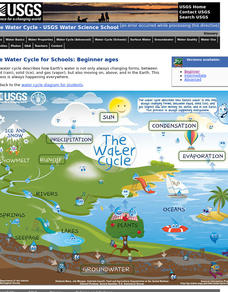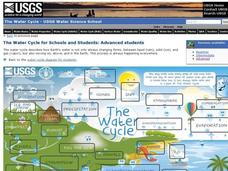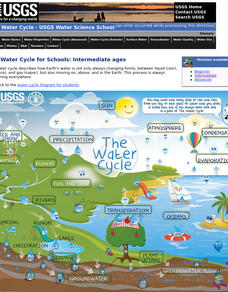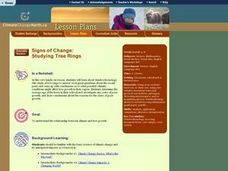Curated OER
Why Do Ice Cubes Melt?
First graders investigate water properties by participating in a hands on experiment. In this ice formation lesson, 1st graders examine real ice cubes in a bowl and identify the reasons why certain cubes melt faster than others. Students...
Curated OER
The Puzzle of the Ice Age Americans
Students describe alternative theories for how the first humans cane to America. For this human origin lesson students study the origins of the first Americans.
Curated OER
Water 1: Water and Ice
Students explore the water cycle. In this water cycle lesson, students complete a hands-on activity that replicates the water cycle. Students record their observations.
Curated OER
Water and Ice
Students will work in small groups, observing an ice cube and recording a description, the feel of the ice, and how it looks when put in another container. Students observe changes in the ice over 15 minute intervals, then freeze the...
Curated OER
The Mastodon Kill
Using the book Bandits, Bears, and Backaches, learners develop an understanding of the pre-history of Arkansas. They follow the trail ofthe giants mastodons and paleo Indians who lived there long ago. The emphasis on this lesson is on...
US Geological Survey
The Water Cycle for Schools: Beginner Ages
Explore a day in the life of a water droplet. An interactive infographic helps scholars learn how water cycles work from precipitation all the way around to condensation. Learners hover over each step of the cycle to read more as they...
US Geological Survey
The Water Cycle for Schools: Advanced Ages
Explore the water cycle in an interactive diagram of the process. The diagram shows how water is a moving system and constantly changing forms. The resourc includes vocabulary words that pupils click on in order to discover more about...
US Geological Survey
The Water Cycle for Schools: Intermediate Ages
Water can travel from the highest mountain tops to the largest oceans. Using an interactive, young scientists trace the movement using an interactive online resource. They follow the water cycle by reading pop-up explanations on a...
Curated OER
Mystery of the Megaflood
Students will use everyday items and speeds to describe the dimensions of a massive flood that occurred in the Pacific Northwest near the end of the last ice age.
Curated OER
Glacial Striation Investigation
Students operate a GPS unit to investigate the direction of glacier movement. They describe the motion of glacier movement by interpreting a graph. Students explain how scientists use glacier striations to determine glacier movement.
Curated OER
Water and Ice
Students participate in various air experiments to understand that air is all around us. In this states of matter lesson, students focus on the role of air in the water cycle. Students understand that air is densest near the ground....
Curated OER
Rock of Ages
Students are given a classification table and samples from their location. They locate their samples on the classification table using the characteristics used in rock identification.
Curated OER
Glacier Puzzle
In this glacier worksheet, students identify and locate vocabulary terms related to glaciers. There are 17 words located in the word search.
Baylor College
What Is the Water Cycle?
Small groups place sand and ice in a covered box, place the box in the sunlight, then observe as evaporation, condensation, and precipitation occur. These models serve as miniature water cycles and demonstrations of the three phases of...
Curated OER
Earth's Water
If the majority of our planet is covered with water, why do we need to bother conserving it? With a thorough and varied investigation into the location and types of water on the earth, learners will gain an understanding of why this...
Curated OER
Plate Tectonics
Students reinforce their knowledge of plate tectonics from what they have already learned on the subject. In this science lesson, students watch a small clip from the movie "Ice Age" which engages the students to participate throughout...
Curated OER
America's Stone Age Explorers
Students watch a Nova program examining the earliest in habitants of the Americas. In groups. they take notes on various topics covered in the program. Among the topics covered are: the Clovis people, Solutrean culture, migration...
Space Awareness
The Big Meltdown
Explore the world (our world) of melting ice caps. Why are these caps melting? What is the effect of melting ice caps? Dive into the ever-present issue of global warming with a resource that has learners looking at data and participating...
Curated OER
Signs of Change: Tree Rings
Students identify and experiment with dendrochronology (the study of tree rings to answer ecological questions about the recent past) and come up with conclusions as to what possible climatic conditions might affect tree growth in their...
Virginia Middle School Engineering Education Initiative
Save the Penguins: An Introduction to Thermodynamics and Heat Transfer
Heat things up in your physical science class with this interactive lesson series on thermodynamics. Through a series of class demonstrations and experiments, young scientists learn how heat is transferred through conduction, convention,...
National Institute of Open Schooling
Water Pollution
Fifteen million children under the age of five die each year due to diseases in their drinking water. Water pollution is the topic of lesson 34 in the series of 36. Scholars, through reading and discussing, study numerous aspects of...
American Museum of Natural History
What Do You Know About Astronomy
Develop an understanding of the universe. Learners answer 10 multiple choice questions about several topics in astronomy. Questions contain information about the age of the universe, gravitational attraction, galaxies, planets and comets...
Curated OER
FRAM: The Most Famous Ship in the World
Seventh graders role play the roles of naval engineer apprentices. In groups, they work together to design a ship which cannot be damaged by freezing ice. They use the internet to research the weather and ocean conditions of the water...
Curated OER
Methuselah Tree
Learners examine how scientists determine the age of living and non-living trees. They simulate the role of a tree-ring scientist, crossdating tree-ring samples and determining which sample is the oldest and the age of the samples.
Other popular searches
- Ice Age Movie
- Ice Age Americans
- Ice Age Misconceptions
- Ice Age Theory
- The Ice Age
- Ice Age Diorama
- Ice Age the Movie
- Ice Age Animals
- Ice Age the Meltdown
- Ice Age Mammals
- Ice Age Movie Questions
- Ice Ages and Glaciation

























